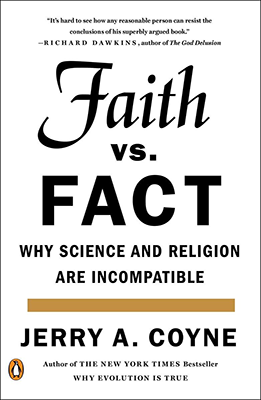Faith Vs Fact
“Faith Versus Fact: Why Science and Religion Are Incompatible” is a book by Jerry A. Coyne, an evolutionary biologist and professor at the University of Chicago. Published in 2015, the book explores the tension between science and religion, arguing that they are fundamentally incompatible ways of understanding the world. Here’s a summary of the key themes and arguments presented in “Faith Versus Fact”:
Definition of Science and Religion: Coyne begins by defining what he means by science and religion. Science, according to Coyne, relies on empirical evidence, reason, and the scientific method to understand the natural world. Religion, on the other hand, is characterized by faith, revelation, and adherence to dogma and supernatural beliefs.
Epistemological Differences: Coyne argues that science and religion are fundamentally different epistemological approaches. Science seeks to explain natural phenomena through testable hypotheses and evidence-based reasoning, while religion relies on faith and revelation as sources of knowledge.
Conflict Thesis: The book presents the conflict thesis, which posits that there is an inherent conflict between science and religion. Coyne discusses historical and contemporary examples where scientific discoveries have challenged religious beliefs and doctrines, leading to conflicts between scientific knowledge and religious teachings.
Scientific Explanations vs. Supernatural Explanations: Coyne emphasizes that scientific explanations are superior to supernatural explanations because they are based on empirical evidence and are subject to revision based on new data. In contrast, supernatural explanations are not testable and do not contribute to our understanding of the natural world.
Religious Accommodationism: Coyne critiques the accommodationist view that science and religion are compatible or can coexist harmoniously. He argues that attempts to reconcile science with religious beliefs often involve compromising scientific principles or distorting religious teachings.
Implications for Society: Coyne discusses the implications of the conflict between science and religion for society, education, public policy, and ethical decision-making. He argues for the promotion of scientific literacy and critical thinking as antidotes to superstition and dogma.
Philosophical and Ethical Considerations: The book explores philosophical questions about the nature of truth, morality, and the role of religion in shaping ethical frameworks. Coyne advocates for a secular approach to ethics and public discourse, grounded in reason and evidence.
Critique of Creationism and Intelligent Design: Coyne addresses creationism and intelligent design as pseudoscientific movements that undermine scientific education and understanding. He critiques attempts to teach these ideas alongside evolution in schools, advocating for the teaching of evolution as the scientifically valid explanation for the diversity of life on Earth.
Overall, “Faith Versus Fact” is a critique of the compatibility between science and religion, arguing that scientific methods and evidence-based reasoning provide a more reliable framework for understanding the natural world and addressing societal challenges. Coyne’s work contributes to ongoing discussions about the relationship between science, religion, and rational inquiry in contemporary society.

